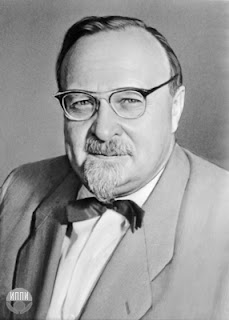Aleksandr Oparin - On This Day
 |
| Oparin |
Russian biochemist Aleksandr Oparin was born on this day in 1894 in Uglich on the river Volga, some 100 miles north of Moscow. He was fascinated with the problem of how life began, and from the early 1920s through to the 1936 publication of his short book The Origin of Life put forward the view that simple organic molecules like amino acids could have formed spontaneously in the seas of our nascent planet. Subsequent experiments by Stanley Miller and others (firing electrical discharges through a model of the primitive atmosphere) have shown this to be a highly plausible hypothesis, although many contemporary scientists favour muds, clays or micas as a preferred site for the early generation of biomolecules.
 |
| Miller's Experiment |
In his later life Oparin fell out of favour with the wider scientific community, mainly due to his endorsement of Lysenko’s rejection of Mendelian genetics – which hampered scientific and economic progress in the USSR through the 1940s and 50s. He died in 1980 and is buried in Moscow.

Comments